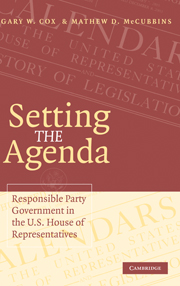Book contents
- Frontmatter
- Contents
- Figures and Tables
- Acknowledgments
- Setting the Agenda
- 1 Introduction
- PART I WHY PARTY GOVERNMENT?
- PART II NEGATIVE AGENDA POWER
- 3 Modeling Agenda Power
- 4 The Primacy of Reed's Rules in House Organization
- 5 Final Passage Votes
- 6 The Costs of Agenda Control
- 7 The Textbook Congress and the Committee on Rules
- 8 The Bills Reported from Committee
- 9 Which Way Does Policy Move?
- PART III THE CONSEQUENCES OF POSITIVE AGENDA POWER AND CONDITIONAL PARTY GOVERNMENT
- Appendix
- Addendum
- Bibliography
- Index
- Author Index
6 - The Costs of Agenda Control
Published online by Cambridge University Press: 05 September 2012
- Frontmatter
- Contents
- Figures and Tables
- Acknowledgments
- Setting the Agenda
- 1 Introduction
- PART I WHY PARTY GOVERNMENT?
- PART II NEGATIVE AGENDA POWER
- 3 Modeling Agenda Power
- 4 The Primacy of Reed's Rules in House Organization
- 5 Final Passage Votes
- 6 The Costs of Agenda Control
- 7 The Textbook Congress and the Committee on Rules
- 8 The Bills Reported from Committee
- 9 Which Way Does Policy Move?
- PART III THE CONSEQUENCES OF POSITIVE AGENDA POWER AND CONDITIONAL PARTY GOVERNMENT
- Appendix
- Addendum
- Bibliography
- Index
- Author Index
Summary
MOVING BEYOND THE IDEALIZED MODEL
The idealized agenda control model that we developed in Chapter 3 assumes that the majority party can costlessly control the legislative agenda. Given costless control – and other simplifications – the model predicts that the majority party should never be rolled.
Controlling the agenda, however, is not perfectly costless, even in a well-functioning cartel. Consider, for example, bills that are pushed by an opposition-party president. For such bills, the majority party in the House may face intense public pressure to put the bill on the floor. The cost of blocking the president's proposal may increase to such an extent that it is no longer worth blocking the bill. The result might be either some sort of interbranch deal, or an outright victory for the president. In either case, the blocking agents for the majority party may be forced to allow such bills onto the agenda and will, as a result, be rolled.
To accommodate this sort of possibility, we assume in this chapter that it may be costly for the majority party to block bills. In particular, there is an exogenous cost, cj, that the majority must pay in order to block bills on dimension j, with cj ≥ 0. Although we take this cost as given when the majority must decide whether to block or not, we imagine – as the previous example suggests – that the cost reflects public interest in the issue at hand, which of course can be drummed up by presidents, minority parties, interest groups, and other actors.
- Type
- Chapter
- Information
- Setting the AgendaResponsible Party Government in the U.S. House of Representatives, pp. 106 - 123Publisher: Cambridge University PressPrint publication year: 2005



